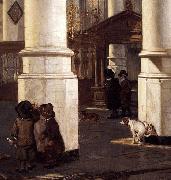La Peinture à l'huile en gros de Chine & Encadre |
|||||||||||

|
|||||||||||
|
|
|
||||||||||||||
|
Emanuel de Witte
(1617 - 1692) was a Dutch perspective painter. In contrast to Pieter Jansz Saenredam, who emphasized architectural accuracy, De Witte was more concerned with the atmosphere of his interiors. Though few in number, de Witte also produced genre paintings. De Witte was born in Alkmaar and learned geometry from his father, a schoolmaster. He joined the local Guild of St Luke in 1636. After a stay in Rotterdam, he moved to Delft and studied with Evert van Aelst. In 1651 de Witte settled in Amsterdam where his first wife, Geerje Arents, died in 1655. He then married a 23-year-old orphan, Lysbeth van der Plas, who exercised a bad influence on de Witte's adolescent daughter. In December 1659 both were arrested for theft from a neighbor.Lysbeth, pregnant, had to leave the city for a period of six years; she lived outside the city walls and died in 1663. Following the arrest of his wife and child, de Witte was forced to indenture himself to the Amsterdam notary and art dealer Joris de Wijs, surrendering all of his work in exchange for room, board, and 800 guilders annually. De Witte broke the contract, was sued by the dealer, and forced to indenture himself further as a result. Several patrons provided de Witte with support, but these relations did not work out well, for he tended to shout at his clients and at people watching him at work in churches. Records tell of his gambling habit and a fight with Gerard de Lairesse. According to Arnold Houbraken, after an argument about the rent, de Witte hanged himself from a canal bridge in 1692. The rope broke and de Witte drowned. Because the canal froze that night, his corpse was not found until eleven weeks later |
||||||||||||||
|
|
||||||||||||||
|
||||||||||||||
|
|
||||||||||||||
| Emanuel de Witte
(1617 - 1692) was a Dutch perspective painter. In contrast to Pieter Jansz Saenredam, who emphasized architectural accuracy, De Witte was more concerned with the atmosphere of his interiors. Though few in number, de Witte also produced genre paintings. De Witte was born in Alkmaar and learned geometry from his father, a schoolmaster. He joined the local Guild of St Luke in 1636. After a stay in Rotterdam, he moved to Delft and studied with Evert van Aelst. In 1651 de Witte settled in Amsterdam where his first wife, Geerje Arents, died in 1655. He then married a 23-year-old orphan, Lysbeth van der Plas, who exercised a bad influence on de Witte's adolescent daughter. In December 1659 both were arrested for theft from a neighbor.Lysbeth, pregnant, had to leave the city for a period of six years; she lived outside the city walls and died in 1663. Following the arrest of his wife and child, de Witte was forced to indenture himself to the Amsterdam notary and art dealer Joris de Wijs, surrendering all of his work in exchange for room, board, and 800 guilders annually. De Witte broke the contract, was sued by the dealer, and forced to indenture himself further as a result. Several patrons provided de Witte with support, but these relations did not work out well, for he tended to shout at his clients and at people watching him at work in churches. Records tell of his gambling habit and a fight with Gerard de Lairesse. According to Arnold Houbraken, after an argument about the rent, de Witte hanged himself from a canal bridge in 1692. The rope broke and de Witte drowned. Because the canal froze that night, his corpse was not found until eleven weeks later Interior_of_the_Oude_Kerk,_Delft between 1650(1650) and 1652(1652) Medium oil on panel between 1650(1650) and 1652(1652) Medium oil on panel |
||||||||||||||
|
Related Paintings to Emanuel de Witte :. |
||||||||||||||
|
|
||||||||||||||
|
|
||||||||||||||
|
CONTACTER DES Etats-Unis |







